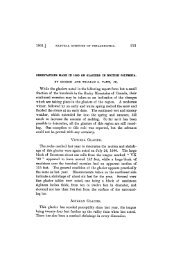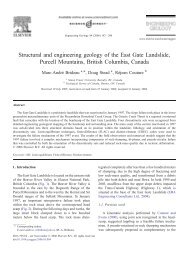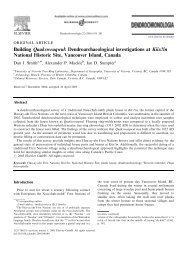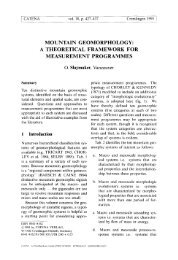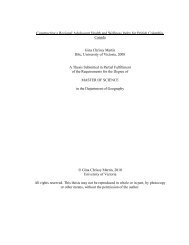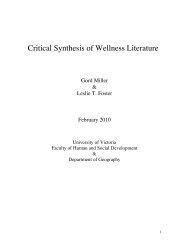Sustainable Food Production, Consumption, and the Generation of
Sustainable Food Production, Consumption, and the Generation of
Sustainable Food Production, Consumption, and the Generation of
Create successful ePaper yourself
Turn your PDF publications into a flip-book with our unique Google optimized e-Paper software.
The Agricultural L<strong>and</strong> Commission (ALC) is similar in its economic objectives, but<br />
differs from Streng<strong>the</strong>ning Farming as an independent Crown agency. “The Commission’s<br />
mission is to preserve agricultural l<strong>and</strong> <strong>and</strong> encourage <strong>and</strong> enable farm businesses throughout<br />
British Columbia” (ALC, 2005). At <strong>the</strong> year-end <strong>of</strong> 2003 <strong>the</strong> l<strong>and</strong> reserve contained nearly five<br />
million hectares <strong>of</strong> l<strong>and</strong>, though only 17, 578 hectares <strong>of</strong> this were within <strong>the</strong> CRD. The main<br />
objectives <strong>of</strong> <strong>the</strong> ALC are <strong>the</strong> retention <strong>of</strong> farml<strong>and</strong> <strong>and</strong> governing how this l<strong>and</strong> is used. The<br />
Agricultural L<strong>and</strong> Commission Act, which was passed on November 1, 2002, consolidated l<strong>and</strong><br />
zoning, subdivision <strong>and</strong> protection policy under <strong>the</strong> jurisdiction <strong>of</strong> <strong>the</strong> ALC, giving <strong>the</strong><br />
commission <strong>the</strong> tools it needed to regulate <strong>the</strong> l<strong>and</strong> reserve.<br />
The ALC <strong>and</strong> Streng<strong>the</strong>ning Farming initiative are B.C.’s major policy <strong>and</strong> regulatory<br />
bodies on farming activities, but, though <strong>the</strong>y are effective in protecting <strong>the</strong> agriculture industry,<br />
<strong>the</strong>y do little to encourage a movement towards food security. In 1998 MAFF compiled a<br />
document entitled Choosing our Future: Options for <strong>the</strong> Agri-<strong>Food</strong> Industry that summarized <strong>the</strong><br />
concerns <strong>of</strong> over 200 stakeholders into a guide for a special committee to build policy<br />
recommendations (MAFF, 1999). The committee was to consult with <strong>the</strong> industry <strong>and</strong> table <strong>the</strong>ir<br />
report by spring <strong>of</strong> 2000. Choosing our Future had high ideals demonstrated in a statement <strong>of</strong> <strong>the</strong><br />
fundamental beliefs <strong>of</strong> those it brought toge<strong>the</strong>r:<br />
“We believe that a strong <strong>and</strong> healthy agri-food sector is vital to <strong>the</strong> economy, <strong>the</strong> environment<br />
<strong>and</strong> <strong>the</strong> future <strong>of</strong> British Columbia We envision a future in which industry, consumers <strong>and</strong><br />
government are committed to ensuring secure, safe, <strong>and</strong> high-quality agri-food products for<br />
British Columbians”. (MAFF 1998: 8)<br />
Despite its promise <strong>of</strong> a new <strong>and</strong> progressive stance on agriculture, <strong>the</strong> committee’s<br />
report was never used to support policy decisions, as it seems to have failed with <strong>the</strong> NDP<br />
provincial government in 2001.<br />
A provincial program that has produced many positive results is <strong>the</strong> ‘Buy BC’ campaign<br />
that was undertaken in concert with <strong>the</strong> BC Agricultural Council in 1993. The program has<br />
proven to be extraordinarily successful in boosting sales <strong>of</strong> British Columbian products, boasting<br />
such statistics as having “over 1200 companies <strong>and</strong> associations using <strong>the</strong> Buy BC logo” which<br />
has achieved a consumer recognition rate <strong>of</strong> over 75%. This mix <strong>of</strong> provincial public policy <strong>and</strong><br />
industry support is a hint <strong>of</strong> what could be accomplished with more proactive food policy<br />
implementation.<br />
39




